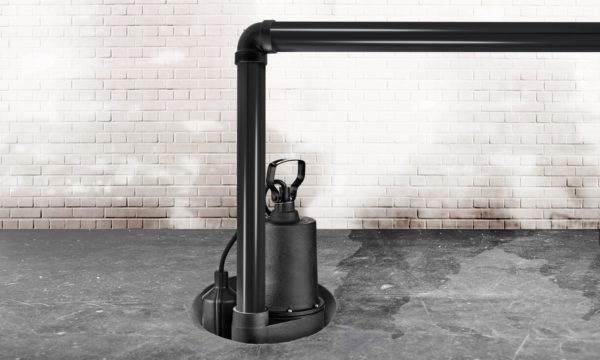
Learn More About Sump Pump Protection in Your Home
Having a sump pump might not seem like a big deal, but not having one could put your basement in jeopardy of becoming damaged by water. Sump pumps are pieces of equipment that work in the background to keep your basement from flooding.
The more you understand about how this essential piece of equipment works, the better you’ll be equipped to handle water issues in your basement. Keep reading to learn more about how sump pumps function, how to ensure your sump pump is always performing at its best, and the benefits of installing this equipment in your home.
Sump Pump Basics
Sump pumps are designed to stop flooding after heavy storms or excessive rainfall. They’re installed in the lowest area of the house. For most homeowners in Columbus, the basement is the lowest part of the home. However, if you live in a home with a slab foundation and don’t have a basement, plumbers might install the sump pump in a utility closet, laundry room, or bathroom on the first level.
There are two parts to a sump pump: the pit and the pump. Some homes have a sump pit rough-in, meaning the pit has already been dug into the basement’s floor, but there’s no pump. A sump pit collects water, but it is useless without a sump pump installed inside of it. Once the sump pump’s installed, water is automatically pumped from the pit when the water reaches a certain level inside it. The water is then pumped out of the house and away from the foundation through a drainage pipe.
The sump pump and the pit are the main parts of the sump pump system. However, the sump pump has other essential elements to keep your home moisture-free. The water pipe that removes water from the pit and deposits it outside is called the sump pump discharge pipe. You have to make sure the water leaving the pit doesn’t rush back into it, so the pipe must have a check valve to prevent water from reentering the pump. The discharge pipe must also be positioned away from the foundation to remove water properly.
How does the water get pumped out? Water leaves the sump pump through a pipe and is pushed out by a motor that operates similarly to a fan. Most sump pumps use electricity to run the motor. However, there are some hand-pump versions. You might consider installing a sump pump battery backup if you have an electric-powered sump pump. Many people find a backup power source for the sump pump handy when there’s a power outage during a storm. The backup protects the basement from flooding by keeping the pump working.
Another sump pump component that’s crucial to the equipment’s smooth operation is the float sensor. The sensor activates the pump automatically when water rises to a certain level. When the water touches the float sensor, the pump turns on and dispels the water from the pit.
How to Ensure Your Sump Pump Always Works
You want to make sure your sump pump is always working well to prevent accidental flooding. At Apex Plumbing, Heating, and Air Pros, we recommend having your sump pump inspected annually. The ideal time for an annual inspection is at the end of winter before spring storms arrive, although you might also want to have your sump pump checked before winter snowstorms arrive. Snowmelt can cause basement flooding too!
During an inspection, our plumbers will perform various services. They’ll remove the cover from the sump pump pit and check for debris. Checking for debris prevents clogs and helps to identify potential problems. If the water in the pump appears greasy, there could be an issue with the pump’s motor.
They’ll next remove and inspect the pump. The inlet screen and impeller should be checked for debris and damage.
The drain hose should also be checked to ensure it’s not blocked. A blocked drain hose can lead to backups and flooding.
The float must be inspected for free movement. A float shouldn’t be restricted or blocked; otherwise, it won’t work properly, and water won’t discharge.
The unit must be tested for proper operation. Our plumbers will fill the pit with water to the discharge level to test if the float senses the rising liquid and turns on the pump.
The discharge pipe will be flushed. This service ensures that nothing is blocking the pipe, and water can move freely from the pump to the outside of the house.
To keep your sump pump working between inspections, you should keep the area around the pump clear. To prevent debris from falling into the pump and damaging the motor, you should avoid storing items near it. Ensure the cover stays on the sump pump pit to prevent pets or small children from knocking or throwing items in.
Why Does the Sump Pump Run Constantly?
Most people have few problems with their sump pumps. However, issues can occasionally arise. The most common concern people have is their sump pump running too often. Sometimes, it’s not a problem but more of a sign that you have a lot of groundwater in your basement. How often the sump pump runs depends on the amount of accumulated moisture. If you’re concerned, reach out to us at Apex Plumbing, Heating, and Air Pros in Columbus to inspect the equipment.
Should You Install a Sump Pump in Your Home?
There are many advantages to installing a sump pump in your residence, but not everyone needs one. Here are some benefits sump pumps offer and reasons you might consider installing this equipment.
Definitely plan for this if your home has a history of flooding. If your basement or lowest level floods even a little bit each time it rains, a sump pump can stop this from happening. Installing a sump pump prevents water from entering your home and stops it from destroying your foundation and other structural components.
Perhaps your basement is typically damp. Flooding isn’t necessarily the only reason why you might have a wet basement. Some basements don’t flood, but they experience permanent moisture problems. Damp air and moisture on the walls and floor can signal groundwater issues. When your basement smells damp constantly, it could be an indication of this. Installing a sump pump can help to alleviate the problem and prevent mold growth.
Perhaps your basement is finished, and you want to protect it. Many households in this area have finished basements for extra living space. Installing a sump pump gives you peace of mind and eliminates constant worry about flooding when heavy storms visit the region. This equipment protects your furnishings, drywall, flooring, and valuables you’ve stored in the basement.
Some people want to prevent water damage from slab leaks. A slab leak happens when a water pipe beneath the foundation leaks or bursts. Slab leaks can eat away at the foundation and cause costly water damage. When a slab leak occurs, a sump pump could minimize the damage.
If you’re interested in learning more about the benefits of sump pump installation, our licensed plumbers are ready to help. We’re qualified to answer your questions about sump pumps, slab leak repair, water leak detection and repair services, and sewer repair and excavation. Besides that, we handle repiping and gas leak detection. Of course, we also offer a complete range of other plumbing services. Call Apex Plumbing, Heating, and Air Pros today for more information.





